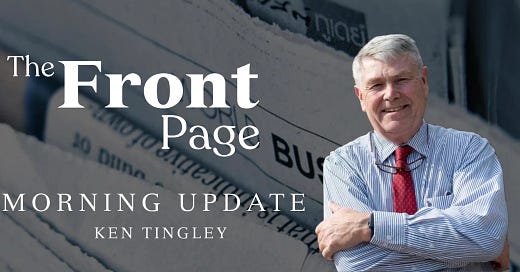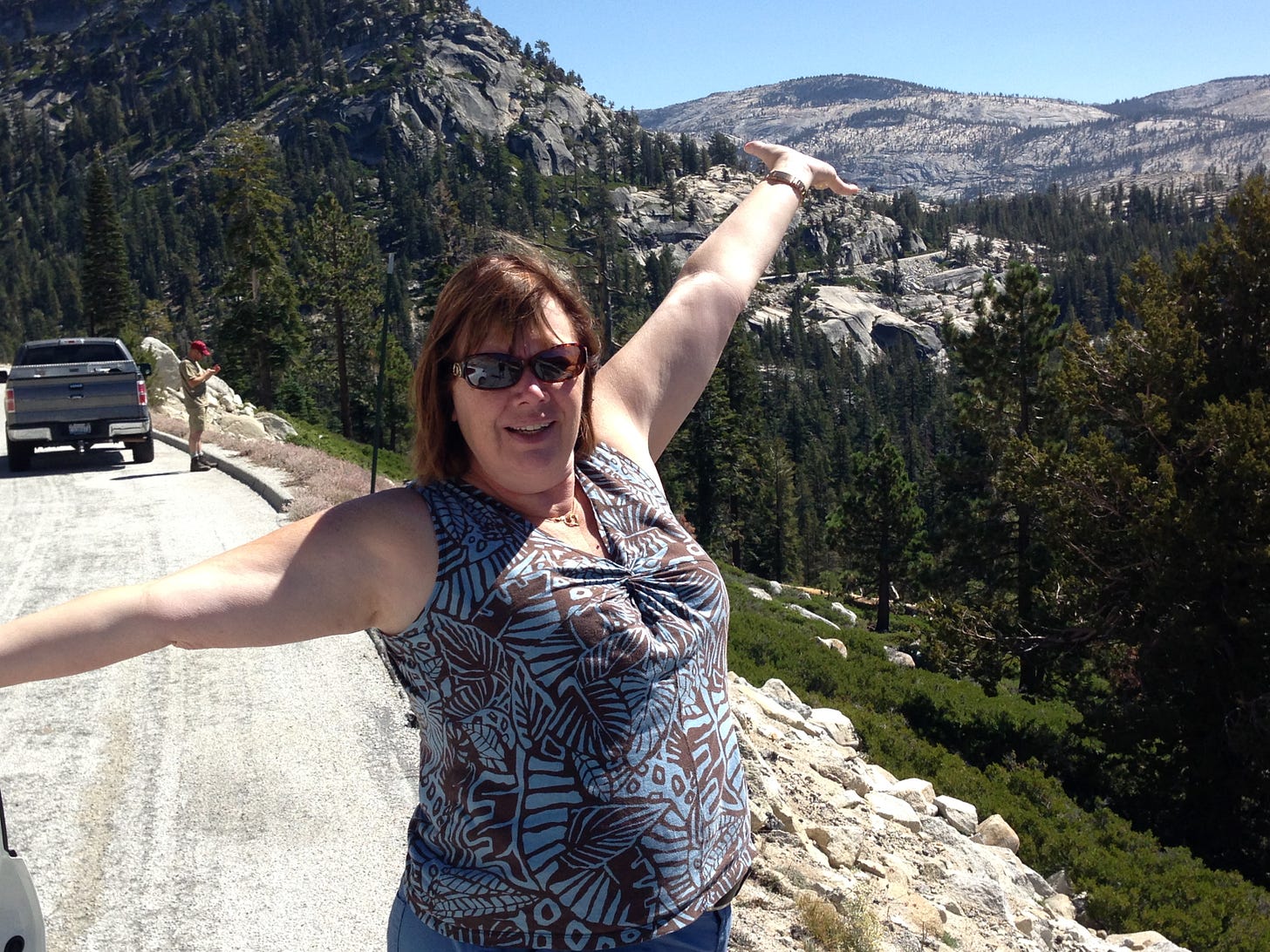Facing those 387 steps, Gillian did what she always did, put one step in front of another
Please consider supporting The Front Page with a paid subscription: HERE
You have to navigate 387 stone steps to reach the bell tower atop the Cathedral of Notre Dame.
It is a tough climb for the best of us.
In 2011, Gillian and I decided to take our 15-year-old history-nerd of a son - by the way that worked out - to see the beaches of Normandy. We decided to spend a few days in Paris first.
Gazing up at the south tower of Notre Dame, Gillian asked again, "How many steps?"
When Notre Dame was built seven centuries ago, there were no allowances made made for an elevator shaft, so Gillian waved off the suggestion to relax in a sidewalk cafe and began the climb.
In the weeks before we left in late August, she knew something was wrong. She felt bloated and had gained some weight. She went from doctor to doctor. None of them took her very seriously. She was being proactive. She didn't want anything to interfere with this trip of a lifetime.
Notre Dame was especially important to her and Joseph. The two of them must have watched Disney's Hunchback of Notre Dame a billion times as Joseph grew up. I think Joseph said "Quasimodo" way before before "Da-Da," so Gillian was not going to be denied sharing the bell tower with him.
The stone staircase at Notre Dame is steep and narrow and I remember her struggling at times, stopping to rest and continuing the climb, finally coming face to face with Victor Hugo's gargoyles and Quasimodo's bells. We all looked out at the stunning vistas of the Seine below and the distant Eiffel Tower and we were glad to be alive.
By the end of the trip, Gillian was icing her swollen ankles and she knew something was wrong.
It was an enterprising physician's assistant named Lynne Keil who diagnosed the ovarian cancer in the days after we returned.
Four days later, a surgeon in Burlington, Vermont removed a grapefruit-size tumor and six liters of fluid. All of which she carried up those 387 steps.
But here is the part you need to remember and the part that even Gillian never fully appreciated. It was from the darkness of that September day that her life really began.
From September to April, Gillian and I regularly made the two-hour drive to Burlington, Vermont - two weeks on, three weeks off - for her chemo treatment. It is odd how quickly the crisis becomes routine, part of the regular rhythms of life. After awhile, it was as if those trips to Burlington were trips for groceries.
And this is important, too.
She made it seem easy.
She made it seem normal, so ho-hum what she was going through.
What an incredible gift that was for Joseph and I. Gillian refused to be the latest heroine of another story about the life-and-death battle with cancer.
Instead, she just led her life.
Perhaps, that is the simple legacy here.
After that first surgery, the doctor called me into the little room where the loved ones are told the future. He told me he had gotten all the cancer. But when I asked the prognosis, he told me statistically, it was 50-50 for three years.
The goal became to get her to her son's high school graduation.
When she wasn't pumping toxic chemicals into her body, she was working 12-hour shifts in pediatrics at Albany Medical Center where, ironically, she was often running the chemo for youngsters who might not see their graduations either. She had instant credibility with the kids because they could compare ports and hair deficiencies.
We never made a specific declaration, but there was something unspoken about taking every opportunity that presented itself and living life to the fullest.
There were trips to Ireland and Italy and Switzerland.
There were high school musicals, orchestra concerts and so many swim meets that chlorine became our eau de toilette. We went on college visits, took photos at the junior prom and watched Joseph graduate high school.
And then there was Christmas. It was always big in our house, but year after year it became an event with a life of its own as Gillian and her sister didn't just decorate the house, they transformed it into a magical Christmas fairyland with themed exhibits atop the kitchen cabinets that reflected the lives we were living.
It wasn't just family for Christmas dinner, but friends, neighbors and reporters who couldn't make it home. The dining room table was never big enough.
Like so many parents, when we left our son at college, we had to stop at the local drug store to get a box of tissues. We then celebrated our new-found freedom by flying to California to see the majesty of Yosemite.
We took her mother to Scotland - her last trip - and our son to Belfast to see where my mother and grown up and where a drunken sailor had sang "My Wild Irish Rose" on her stoop.
But life should not be measured in travelogue terms. It was the three of us sharing those experiences. And after watching a sunset for the ages over the Alps on Lake Como, we drank the rest of our wine and engaged in the most ridiculous and raucous game of charades.
Forget about seeing The Last Supper, it was that night of charades I will always remember.
We visited Joseph so much at his college in western Pennsylvania, our friends wondered why we just didn't move there ourselves.
Each time we departed was bittersweet and the three of us would link arms in some parking lot, slowly bob up and down and chant. The goal was to embarrass our college-boy son that he had such weird parents, but he never seemed embarrassed.
Yes, the cancer came back and it kept coming back and each time Gillian rallied. She helped Joseph move into his first apartment in graduate school, then his first condo in San Antonio and another in New Orleans.
For 13 years, we always looked to the future and the adventure we could share together. Earlier this year, I told her I wanted to go to California to visit the Academy Award Museum and the Ronald Reagan Presidential Library but I knew she was struggling with a bad knee and sore hip. She told me to go without her, then a couple days later she said, "Well, if you are going all the way to California, we might as well go to Hawaii, too."
That was special.
The two of us.
So I want you to remember how fast this life goes and then incorporate that into your own lives.
After Gillian got out of the hospital a couple weeks ago - there was nothing more they could do - I was trying to be practical, responsible, maybe to face reality for the first time. But it was one thing neither of us were ever able to do - figure out how to say goodbye.
I finally asked her about having a service and if there was something she wanted read or some music she'd like played.
She finally mumbled out a few words that I did not understand.
I asked her to repeat it.
"I want a plaque," she said with a clarity that shocked me.
"You want a plaque," I repeated, somewhat confused. "What do you want a plaque for."
There was just a hint of a smile, that mischievous Gilly smirk I knew so well for all these past four decades.
"For Notre Dame," she finally said.
And I burst out laughing.
The plaque was for those 387 steps when the cancer demanded she stay planted on earth.
And we were both back there again. The three of us gazing out on Paris and living our life. And what I remember now more than anything is that the best was still yet to come.
Ken Tingley spent more than four decades working in small community newspapers in upstate New York. Since retirement in 2020 he has written three books and is currently adapting his second book "The Last American Newspaper" into a play. He currently lives in Queensbury, N.Y.








Thank you for sharing how your family has navigated this very personal path that so many others also have to figure out. 💜
Thank you, Ken. Just beautiful.